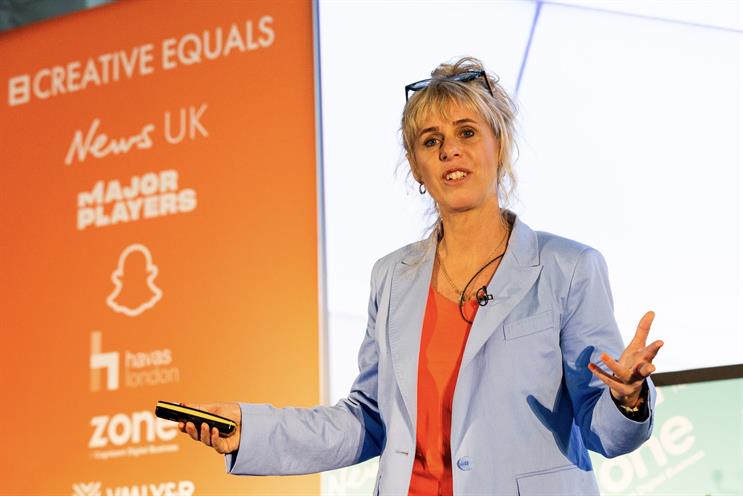“We have all been through a lot and we have all had to ask ourselves hard questions about what we want and how we can come to work and fulfil our potential.”
Opening Creative Equals’ Rise conference held at the Royal Horticultural Halls in London last week, Ali Hanan (pictured above), the organisation's chief executive, pointed to the cost of losing diverse talent, explaining: "Who makes the work shapes the work".
With "The Great Resignation" continuing to top the agenda, shaping the work and the workplace itself in new, innovative and inclusive ways is vital to the long-term success and cultural relevance of the industry. With that in mind here are 10 key takeaways from the day:
1. For anti-racist work to succeed, the industry must act collectively
“What I don't want to see is people in the most junior position, or the only black or brown faces in the room taking it [anti-racism work] on, on top of their existing jobs.”
Reni Eddo-Lodge, journalist, podcaster and author of the groundbreaking book Why I'm no Longer Talking to White People about Race, powerfully shared her view on the importance of "collective self-reflection" in anti-racism work.
In a wide-ranging and thought-provoking interview with Dominic Carter, executive vice-president and publisher of The Sun, Eddo-Lodge urged the audience to: “Analyse your own power and how that is affecting the room as it can cut off our empathy.”
2. The industry is making slow progress on equality
In 2016, just 12% of adland’s creatives were women. Today, global data from LinkedIn puts that figure at 29%, while data from Creative Equals combined with industry recruitment data puts that figure at between 26% and 27% in the UK.
However, according to IPA statistics, women in C-suite positions fell from 34% in 2019 to 33.4% in 2020. There is much more to do if the industry is to reach equality.
3. Make space for the "midfluencer"
"I don’t think I’ve ever related to a woman in advertising." Caitlin Moran, journalist, author and broadcaster, shared her view that "advertising seems to be lagging behind" when it comes to representing and connecting with women.
In a wide-ranging conversation with Vicki Maguire, chief creative officer at Havas London, the duo discussed how advertisers were missing out on the power of older women, or "midfuencers" by failing to reflect, employ or understand them.
As Maguire quipped: “As soon as I turned 50, advertisers suddenly stopped telling me I should buy Chanel and started telling me I smelled of wee.”
4. Community is vital to creative growth
“The most important thing I had is a community,” Sophie Duker, the comedian and writer, said, as she shared with the audience that having a supportive community of peers reminded her she had all the tools to cut through her nerves and perform at Live at The Apollo.
5. Challenge the notion of "human centricity" at all costs
In the lexicon of marketing jargon, there are few more over-used words than "customer centricity" and "human centricity".
Yet, as Esther Duran, chief design officer at Zone, explained, leaders need to think about sustainability first.
“We humans are not at the centre of everything,” she said, sharing her view that companies need to think harder about the unintended consequences of the products and services they design.
6. Diverse casting is a red herring
Efrain Ayala, global director of diversity and inclusion, marketing at Reckitt, galvanised the audience with a heartfelt reminder of the opportunity for inclusive leaders to drive meaningful change.
However, he warned: “I have seen many brands and storytellers distracted by diverse casting as a tick-box exercise... If you are talking about diversity and inclusion in isolation, then you have missed the mark.”
7. Inclusive leadership means adopting fair NDAs
“Being put under a non-disclosure agreement is an ongoing trauma,” Jerry Daykin, commercial co-director at Outvertising, said, while launching the "Make NDAs Fair" campaign, which aims to implement a policy to end the systematic misuse of NDAs in relation to sexual harassment cases. The group is asking agencies to commit to the policy publicly.
As Shilpern Savani, dispute resolution and employment partner at Gunnercooke, told the audience: “These are small changes, but ones that can be game-changing.”
8. Feedback isn’t always a gift (especially if you are a woman)
The disconnect between "bringing your whole self to work" and the reality of sexism, racism and microaggressions in the workplace was brought to life with empathy and understanding by Gemma Greaves, co-founder of Nurture.
In an interactive "fishbowl", attendees confidentially shared their experience of damaging and destructive feedback in the workplace underlining Greaves’ observation that feedback isn’t always a gift.
9. Equality is everyone’s job
Unveiling an to the industry to mobilise the 14 million parents across the UK to campaign for a childcare revolution, Mandu Reid, leader of The Women’s Equality Party, underlined the power of creativity on a shoestring to make an impact on politics.
Yet in a conference room predominantly made up of women, Reid underlined that equality is everyone’s job.
“The only way we get to destination equality is if men and women work together,” she said.
10. Keep going: your best work is ahead of you
At a time when burnout is at the top of the industry agenda, Jo Wallace, creative leader and founder of Good Girls Eat Dinner, inspired the audience with a reminder that "your best work is still ahead of you".
Her message to women on the brink of leaving the industry was heartfelt and simple. “Don’t go,” she said, adding: “We need your perspective, your experience, your minds.”
A compelling reminder of the ability of inclusive leaders not just to create impactful, effective and meaningful work but to make the space for the next generation of creative leaders to thrive on their own terms.
Nicola Kemp is editorial director of Creativebrief and on the advisory board of Creative Equals
Photo credit: Bronac McNeill


